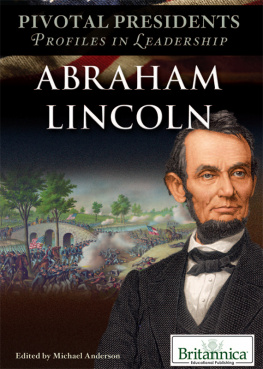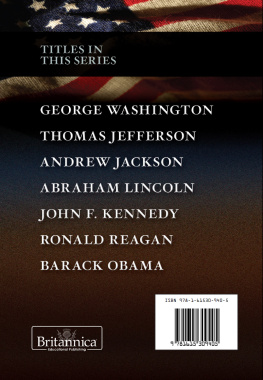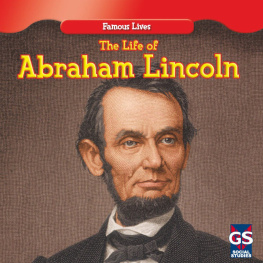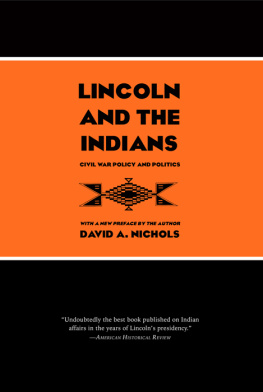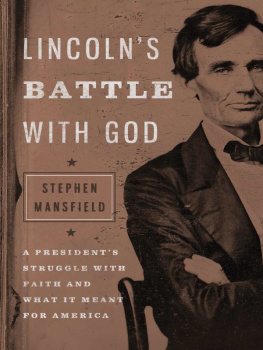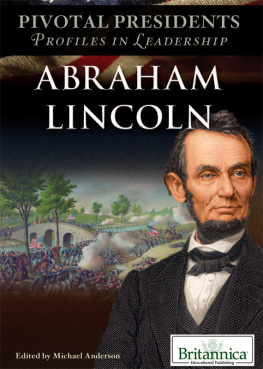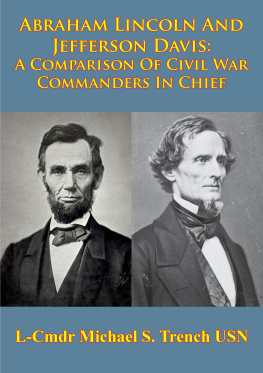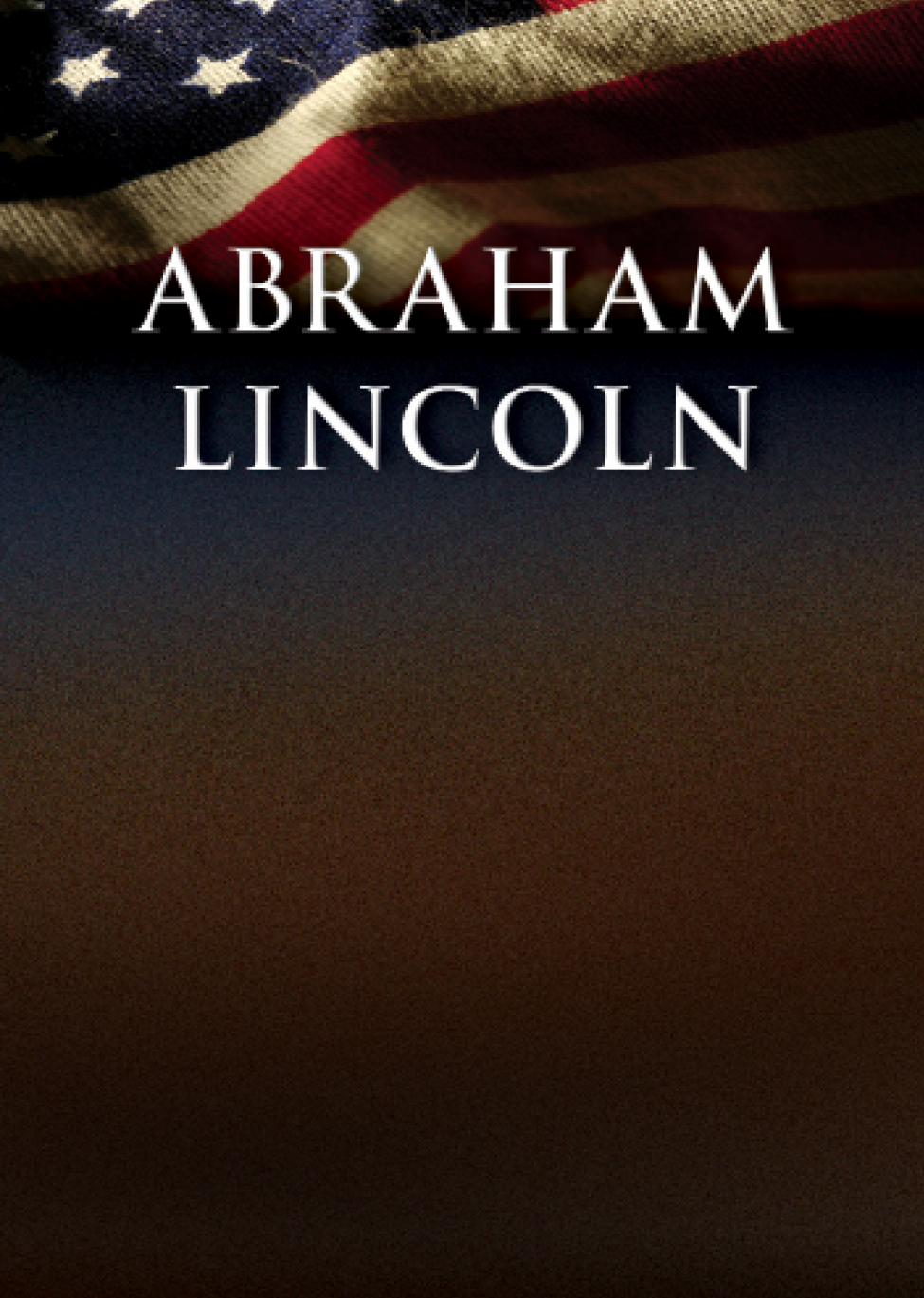
Published in 2013 by Britannica Educational Publishing (a trademark of Encyclopdia Britannica, Inc.) in association with Rosen Educational Services, LLC 29 East 21st Street, New York, NY 10010.
Copyright 2013 Encyclopdia Britannica, Inc. Britannica, Encyclopdia Britannica, and the Thistle logo are registered trademarks of Encyclopdia Britannica, Inc. All rights reserved.
Rosen Educational Services materials copyright 2013 Rosen Educational Services, LLC. All rights reserved.
Distributed exclusively by Rosen Educational Services.
For a listing of additional Britannica Educational Publishing titles, call toll free (800) 237-9932.
First Edition
Britannica Educational Publishing
J.E. Luebering: Director, Core Reference Group, Encyclopdia Britannica
Adam Augustyn: Assistant Manager, Encyclopdia Britannica
Anthony L. Green: Editor, Comptons by Britannica
Michael Anderson: Senior Editor, Comptons by Britannica
Andrea R. Field: Senior Editor, Comptons by Britannica
Sherman Hollar: Senior Editor, Comptons by Britannica
Marilyn L. Barton: Senior Coordinator, Production Control
Steven Bosco: Director, Editorial Technologies
Lisa S. Braucher: Senior Producer and Data Editor
Yvette Charboneau: Senior Copy Editor
Kathy Nakamura: Manager, Media Acquisition
Rosen Educational Services
Hope Lourie Killcoyne: Executive Editor
Nelson S: Art Director
Cindy Reiman: Photography Manager
Karen Huang: Photo Researcher
Brian Garvey: Designer, Cover Design
Introduction by Hope Lourie Killcoyne
Library of Congress Cataloging-in-Publication Data
Abraham Lincoln/edited by Michael Anderson.
p. cm.(Pivotal Presidents: Profiles in Leadership)
In association with Britannica Educational Publishing, Rosen Educational Services.
Includes bibliographical references and index.
ISBN 978-1-61530-946-7 (eBook)
1. Lincoln, Abraham, 18091865Juvenile literature. 2. PresidentsUnited StatesBiographyJuvenile literature. 3. United StatesHistoryCivil War, 18611865Juvenile literature. 4. United StatesPolitics and government18611865Juvenile literature. I. Anderson, Michael, 1972
E457.905.A293 2012
973.7092dc23
[B]
2012020487
Manufactured in the United States of America
On the cover, page 3: Behind the portrait of Abraham Lincoln, the 16th president of the United States, is an illustration depicting the Battle of Antietam, one of the bloodiest battles of the American Civil War. It was on the heels of this Union victory that Lincoln issued what he called the central act of his administration: the Emancipation Proclamation, which freed all slaves in Confederate states. Stock Montage/Archive Photos/Getty Images (Lincoln); Buyenlarge/Archive Photos/Getty Images (Antietam).
Cover, pp. 1, 3 (flag) iStockphoto.com/spxChrome; pp. 5, 12, 23, 39, 49, 70, 73, 76, 78 Fedrov Oleksiy/Shutterstock.com
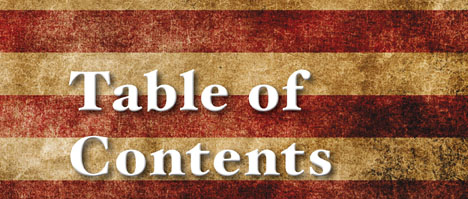
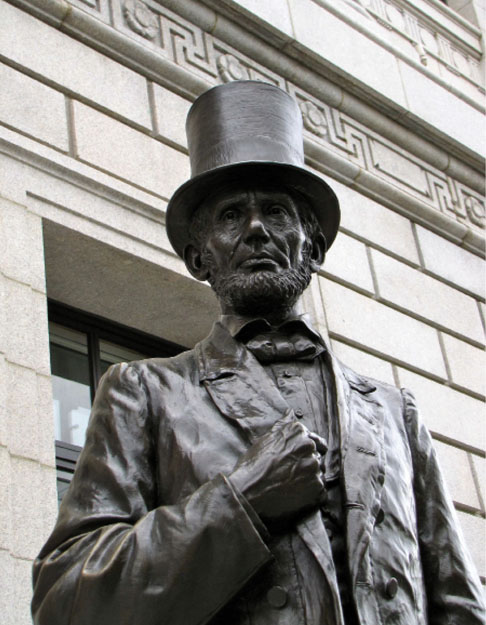
A life-sized bronze statue of Abraham Lincoln stands in front of the entrance to the New York Historical Society. With the stovepipe hat, the statue is nearly 7 feet (2 meters) tall. Hope Lourie Killcoyne
For most Americans, conjuring a mental image of Abraham Lincoln is not that hard to do. The figure is tall. Lanky. Theres the hat. The beard. The wry smile and the glint in the eye. Trying to visualize other presidents, though, is another story. Aside from recent leaders and some near-mythic early onesWashington, Jeffersonvery few strike the visual chord that Lincoln does. (Admit it: try to picture Benjamin Harrison and the slate is blank.)
But Lincoln was not just a memorable face. Despite the fact that all told, Abe Lincoln, the 16th president of the United States of America, spent less than a year in school, he was a brilliant orator, issuing profound and precise sentiments that could not but command the attention of his listeners, be they sympathetic to his politics or not. Consider this prescient passage from one of his most famous speeches, delivered in 1858, two years before he was elected president and nearly three years before the start of the Civil War:
A house divided against itself cannot stand. I believe this government cannot endure, permanently, half slave and half free. I do not expect the Union to be dissolved; I do not expect the house to fall; but I do expect it will cease to be divided. It will become all one thing, or all the other.
Or this line, delivered by then-President Lincoln to an Indiana regiment in March 1865, four years into the war:
Whenever I hear anyone arguing for slavery, I feel a strong impulse to see it tried on him personally.
Perhaps it was the axe-wielding prowess Lincoln mastered in his early years that informed his way with words, allowing him to chop to the core of a complex issue, but he was a master at creating tight, pithy utterances. Perhaps the most memorable and extraordinary example of Lincolns singular ability to find the essence of an occasion (or thought or emotion) was his 268-word Gettysburg Address in 1863. As president, Lincoln was asked to speak to those gathered at the dedication ceremony of the National Cemetery on the site of one of the Civil Wars deadliest battles (nearly 8,000 soldiers died in the three-day struggle). His presence at the site was something of a postscript to the main speaker, Edward Everett, an erudite and esteemed orator of the day. Lincolns speech began with the now indelible sentence:
Four score and seven years ago our fathers brought forth on this continent a new nation, conceived in liberty and dedicated to the proposition that all men are created equal.
Lincolns speech took a mere three minutes; Everetts lasted two hours. It is a fairly safe bet that most Americans do not even remember that Everett spoke at Gettysburg on that day, but say those words from Lincolns address, and they will know, if not whence it came, then at least who said it.
Lincolns character is also well known. Honest. Hardworking. Humble. Intelligent. Thoughtfully decisive. He was not, however, always strictly serious, and his sense of humor is sometimes overlooked. Witness this line, uttered (and then recounted) by Lincoln in a dream of his in response to an observer commenting that he was a common-looking man:
Common-looking people are the best in the world: that is the reason the Lord makes so many of them.
What readers also may not know about Lincolnand will learn in this bookis that he was a gifted wrestler. And that before becoming a lawyer, a member of the Illinois General Assembly, a representative of Illinois in the U.S. Congress, and ultimately one of the most pivotal presidents of the United States of America, he had held jobs as a rail splitter, a postmaster, a store clerk, a ferryboat pilot, and a surveyor. Many hats for the man famous for wearing the stovepipe hat. But as the multitalented and variously employed man from Kentucky once said:
Whatever you are, be a good one.
T he 16th president of the United States, Abraham Lincoln not only ranks among the greatest of all American statesmen; many historians also place him among the greatest men of all time. Lincoln came to the presidency at a time of extreme crisis, with the country at the brink of a civil war that threatened to split North from South. Combining his roles as statesman and commander in chief, Lincoln led the federal armies to victory and held the Union together. Along the way he brought about the end of slavery in the United States.
Next page
